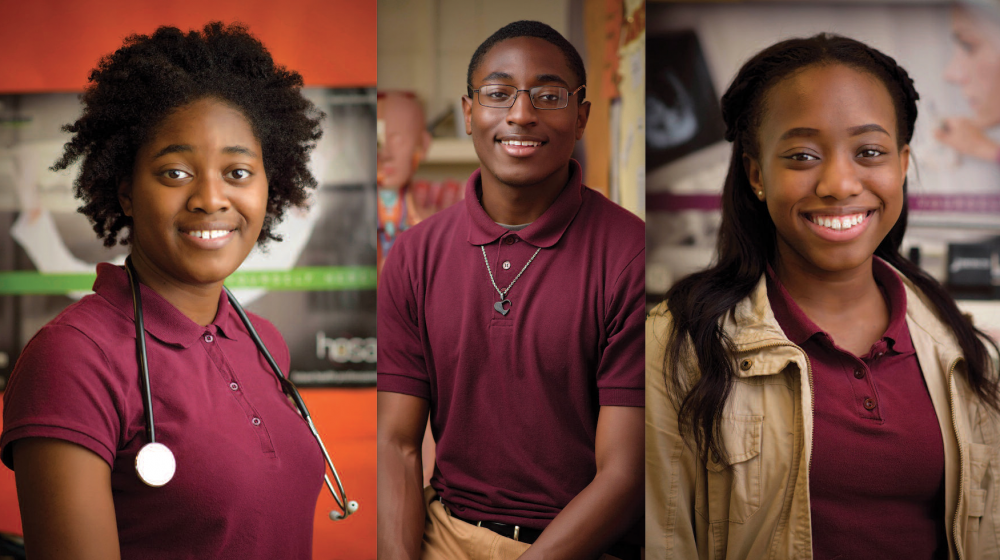Doing the “Heart” Work

From left to right, Arlencia Barnes, Quindarrius Whitley, and Taylor Harris
Three Junior Master Wellness volunteers share healthy living messages
Arlencia Barnes • Indianola
Her family has battled diabetes for decades, but Arlencia Barnes is determined that her generation will overcome it. Because of the Mississippi State University Extension Service’s Junior Master Wellness Volunteers program, Arlencia and her family are now making healthier eating choices.
“Elders in my family have diabetes and high blood pressure, but, after I decided to do Junior Master Wellness, I started talking with them about how to maintain their blood sugar and eat healthier,” Arlencia explains. “My grandmother’s diet and my father’s diet have changed drastically.
“Now, neither of them have to take their diabetes pills every day. They are so much better.”
Arlencia studied health science at Indianola Career and Technical Center before her May graduation from Gentry High School. She says being a Junior Master Wellness volunteer gave her a great foundation for becoming a wellness professional. The Extension program, recently piloted in Sunflower and Itawamba counties, partners with Allied Health Services.
“Being able to be hands-on and give accurate advice gives me the feel of what I’ll be doing as a doctor,” Arlencia says. “The No. 1 lesson for people is to be active. Diabetes can be prevented by eating right and working out. Sugar and salt taste good, but they’re not healthy.”
Communicating with people and making personal connections are just two benefits of the program, Arlencia says.
“Be dedicated: Junior Master Wellness is about helping people,” she emphasizes. “If you have it in your heart to help somebody find a solution and feel better, this program will give you insight into what you need to know to be able to talk to your patient.”
Arlencia’s Junior Master Wellness volunteer success inspired her to join Sunflower County’s 4-H Youth Development program. She participated in the 2015 Mississippi 4-H Congress and won third place for her Health/Visual project.
Quindarrius Whitley • Indianola
Quindarrius Whitley plans to be a sports physician, but the Class of 2016 graduate got his real start in medicine, he says, by becoming a Junior Master Wellness volunteer.
He signed up when the Junior Master Wellness program was introduced in 2014 at Gentry High School’s Indianola Career and Technical Center. Extension agent Ann Twiner partnered with health science teacher Angela Patton to train volunteers about healthy eating and living, as well as stress management and health screenings.
Quindarrius now shares research-based health knowledge with school athletes, including track runners and football players, as well as other students. Interacting with his peers has improved Quindarrius’s self-confidence, he says.
“When I joined the Junior Master Wellness volunteers, I felt part of something much bigger,” he emphasizes. “It made me feel like I had a confidence booster, and, now, when I talk to people about their health, I’m very confident, and I like to help them.”
Quindarrius says using the right words helps him explain health topics and connect with his audience.
“Before I started talking to the other students, my teacher talked a lot about being polite to the people we talk to, being social with others,” he says. “It’s important to watch what you say. I like to help, and knowing how to talk to people is helping me help them.”
As a Junior Master Wellness volunteer, Quindarrius is sharing important health messages that are improving health among his classmates, he says.
“Stress management and healthy eating are my top two things: I’m telling other students that they need to eat better, and I’m showing them how to manage their stress,” Quindarrius says. “People ask me, ‘What can I do to be better, to be more healthy?’ I love talking to them about what they can do.”
Taylor Harris • Moorhead
Like the rest of the Class of 2016 at Gentry High, Taylor Harris had to complete a volunteer requirement. For Taylor, though, becoming a member of Extension’s Junior Master Wellness program was an opportunity, not an obligation.
“Being a Junior Master Wellness volunteer is the easiest way for you to earn the community service hours you need to graduate,” Taylor says. “It’s great to be able to tell people what they can do to prevent diseases and help them live better lives.”
Taylor has always been interested in healthcare, and she joined the Junior Master Wellness program to reinforce the concepts she was learning in the high school’s health sciences track.
She learned how to take an accurate blood pressure reading and how health issues can negatively impact quality of life, she explains. The knowledge she’s gained by becoming a Junior Master Wellness volunteer has changed the way that Taylor—and her friends—eat and exercise.
“We feel we have to eat better, and I’ve started to exercise more with my friends,” she says. “We’ve been exercising an hour-and-a-half a day at the park. We walk the track when we get there; then, we do a 30-minute workout on the iPhone. We finish doing two more laps around the track.
“The Junior Master Wellness program has really helped motivate my friends and me.”
She says her favorite part of the volunteer experience is working with people one-on-one. By talking to community members about diseases, including diabetes, high blood pressure, and tobacco addiction, Taylor is improving both her communication and leadership skills.
“I love working with people, and I’m loving being a Junior Master Wellness volunteer right now,” Taylor says. “It’s a great way to get to interact with people.”
Visit http://extension.msstate.edu to learn more about the Junior Master Wellness program, or contact program coordinators, David Buys or Ann Sansing.
Buys, State Health Specialist and assistant Extension and research professor, is available at david.buys@msstate.edu or 662-325-3060, and Sansing, Extension instructor, can be reached at aps6@msstate.edu or 662-325-4043.


